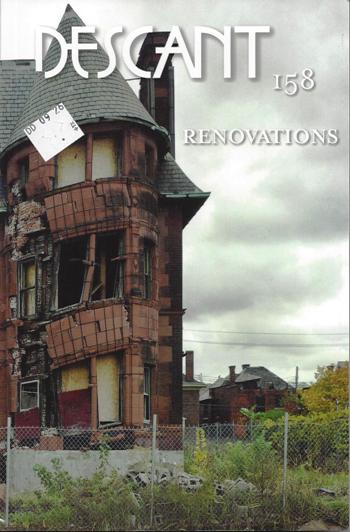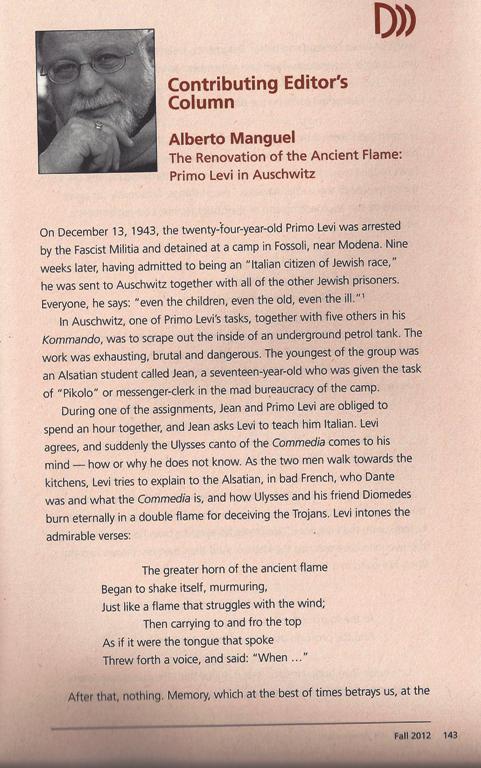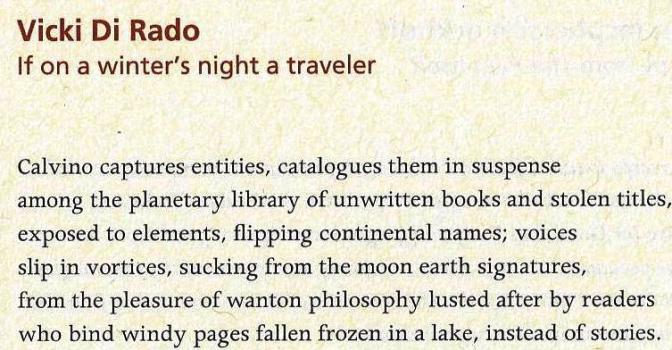|
|
Tôi gặp anh
Vũ Ngọc Thăng lần đầu vào năm 2006, tầm tháng Chín tháng Mười gì đó,
tại Hà Nội.
Trước đó đã có viết email trao đổi, hình như qua giới thiệu của Phạm
Thị Hoài,
nhưng gặp nhau cũng chẳng nói mấy chuyện; đi theo Italo Calvino hình
như toàn
những người không nói lắm. Anh Vũ Ngọc Thăng là một trong vài người
đang sống ở
Canada đóng góp cho dịch thuật tiếng Việt, thuần túy vì văn chương. Hai
người nữa
là Nguyễn Khánh Long (Vu khống và Lại
chơi với lửa) và Nguyễn Quốc Trụ (Istanbul);
hình như ba người không ai quen biết ai, và cả ba đều có những trang
dịch thần
sầu từ mấy tác giả cũng thần sầu, và cũng thuần túy văn chương.
Blog NL
Gấu quen cả
hai, và đều qua NTV.
NKL học Văn Khoa Sài Gòn, cùng với ông anh BHD.
NKL không thường đâu. Cực kiêu ngạo. Khi Gấu nhắc tới băng nhà văn
Montreal,
trong lần đầu NTV giới thiệu, anh bực ra mặt, tôi có bao giờ đọc mấy
ông đó
đâu!
Còn VNT, khá thân, tính tình được lắm. VNT có thời gian dài ở Ý trước
khi qua
Canada. Anh rành tiếng Ý, dịch I-tà-lồ từ nguyên tác. Gấu lỡ mê
Faulkner rồi,
nên ít đọc giả tưởng nằm ngoài dòng Faulkner, nhưng tiểu luận của I tà
lồ, thì
quá mê!
Cái nhìn phê bình của ông khi đọc những tác giả nổi tiếng, là của riêng
ông,
nhiều khi khác hẳn cái nhìn chung của đa số; giống Pamuk, tách hẳn ra
khỏi kinh
điển, nếu gặp Thầy Đạo thì lại bị chê là không phải dân chuyên ngành!
 

On December
13, 1943, the twenty-four-year-old Primo Levi was arrested by the
Fascist
Militia and detained at a camp in Fossoli, near Modena. Nine weeks
later,
having admitted to being an "Italian citizen of Jewish race," he was
sent to Auschwitz together with all of the other Jewish prisoners.
Everyone, he
says: "even the children, even the old, even the ill."
In
Auschwitz, one of Primo Levi's tasks, together with five others in his
Kommando, was to scrape out the inside of an underground petrol tank.
The work
was exhausting, brutal and dangerous. The youngest of the group was an
Alsatian
student called Jean, a seventeen-year-old who was given the task of
“Pikolo" or messenger-clerk in the mad bureaucracy of the camp.
During one
of the assignments, Jean and Primo Levi are obliged to spend an hour
together,
and Jean asks Levi to teach him Italian. Levi agrees, and suddenly the
Ulysses
canto of the Commedia comes
to his mind - how or why he does not know. As the
two men walk towards the kitchens, Levi tries to explain to the
Alsatian, in
bad French, who Dante was and what the Commedia is, and how Ulysses and
his
friend Diomedes burn eternally in a double flame for deceiving the
Trojans.
Levi intones the admirable verses:
The greater
horn of the ancient flame
Began to
shake itself, murmuring,
Just like a
flame that struggles with the wind;
Then
carrying to and fro the top
As if it
were the tongue that spoke
Threw forth
a voice, and said: "When ... "
After that,
nothing. Memory, which at the best of times betrays us,....
Nhắc tới
Italo Calvino, nhân xuống phố đổi phim, bèn quơ số Descant, Đổi Mới, Renovations,
trong có bài essay thật ngắn về “Nếu Đêm Đông Lạnh Lẽo Chúa Sinh Ra
Đời”. Quơ, là vì bài viết của Alberto Manguel: Đổi Mới Ngọn Lửa Cũ:
Primo
Levi ở Auschwitz [The Renovation of the Ancient Flame]
|



